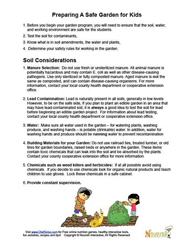Gardening engages children by having them use all their senses while interacting with food.
School gardens are a great way to teach children about where food really comes from and get them interested in healthy foods. Children are more apt to try a new food that they have seen grown from a small seed.
We have numerous worksheets, activities and games that are perfect to help kids learn about healthy foods as part of a kids gardening program in a very fun and positive way. All our material is free and available in English and Spanish.
Happy Planting, Gardening and Harvesting!

Healthy Harvest Maze is a fun game that teaches children about the importance of fruits and vegetables. Children will enjoy helping Chef Solus pick fruits and vegetables as they find their way through a field, orchard and a garden maze. Children get points for picking these healthy foods while learning about the healthy benefits, and nutrients for each food item they have harvested.
Read about the fruits and vegetables listed in the Healthy Harvest Maze Game.

If you need a little ammunition to get your school garden program funded, share these research papers that show a positive, healthy correlation between nutrition, behavior and kids gardening programs.
Improve social skills and behavior.
- DeMarco, L., P. D. Relf, and A. McDaniel. 1999. Integrating gardening into the elementary school curriculum. HortTechnology 9(2):276-281.
Improve environmental attitudes, especially in younger students.
- Skelly, S. M., and J. M. Zajicek. 1998. The effect of an interdisciplinary garden program on the environmental attitudes of elementary school students. HortTechnology 8(4):579- 583.
Instill appreciation and respect for nature that lasts into adulthood.
- Lohr, V.I. and C.H. Pearson-Mims. 2005. Children’s active and passive interactions with plants influence their attitudes and actions toward trees and gardening as adults. HortTechnology. 15(3): 472-476.
Improve life skills, including working with groups and self-understanding.
- Robinson, C.W., and J. M. Zajicek. 2005. Growing minds: the effects of a one-year school garden program on six constructs of life skills of elementary school children. HortTechnology 15(3):453-457.
Increase interest in eating fruits and vegetables and improve attitude toward fruits and vegetables.
- Pothukuchi, K. 2004. Hortaliza: A Youth “Nutrition Garden” in Southwest Detroit. Children, Youth and Environments 14(2):124-155.
Improve attitude toward vegetables and toward fruit and vegetable snacks
- Lineberger, S. E., and J. M. Zajicek. 1999. School gardens: Can a hands-on teaching tool affect students’ attitudes and behaviors regarding fruits and vegetables? HortTechnology 10(3):593-597.
Improve nutrition knowledge and vegetable preferences.
- Morris, JL and Zidenberg-Cherr, S. 2002. Garden-based nutrition curriculum improves fourth-grade school children's knowledge of nutrition and preferences for some vegetables. Journal of the American Dietetic Association 102(1): 91-93.
Increase preference of vegetables.
-Gatto, N., Ventura, E., Cook, L., Gyllenhammer, L., and Davis, J. 2012. LA Sprouts: A garden-based nutrition intervention pilot program influences motivation and preferences for fruits and vegetables in Latino youth. Journal of the Academy of Nutrition and Dietetics 112(6): 913-920.
- Morris, JL and Zidenberg-Cherr, S. 2002. Garden-based nutrition curriculum improves fourth-grade school children's knowledge of nutrition and preferences for some vegetables. Journal of the American Dietetic Association 102(1): 91-93.
Increase children’s knowledge about the benefits of eating fruit and vegetables and participants reported eating healthier snacks.
- Koch, S., T. M. Waliczek, and J.M. Zajicek. 2006. The Effect of Summer Garden Program on the Nutritional Knowledge, Attitudes and Behaviors of Children. HortTechnology 16 (4): 620-625.
Increase fruit and vegetable consumption in adolescents.
- McAleese, J.D., and L.L. Rankin. 2007. Garden-Based Nutrition Education Affects Fruit and Vegetable Consumption in Sixth-Grade Adolescents. Journal of the American Dietetic Association. 107 (4): 662-665.
Contribute to communication of knowledge and emotions, while developing skills that will help them be more successful in school.
- Miller, D. L. The Seeds of Learning: Young Children Develop Important Skills Through Their Gardening Activities at a Midwestern Early Education Program.Applied Environmental Education & Communication 6(1):49-66.
Have a positive impact on student achievement and behavior.
- Blair, D. (2009). The child in the garden: an evaluative review of the benefits of school gardening. Journal of Environmental Education 40(2), 15-38.
0 Comments